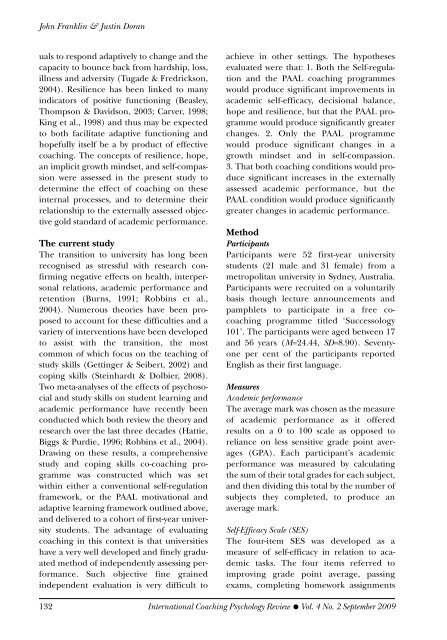International Coaching Psychology Review, 4.2, September 2009
International Coaching Psychology Review, 4.2, September 2009
International Coaching Psychology Review, 4.2, September 2009
You also want an ePaper? Increase the reach of your titles
YUMPU automatically turns print PDFs into web optimized ePapers that Google loves.
John Franklin & Justin Doran<br />
uals to respond adaptively to change and the<br />
capacity to bounce back from hardship, loss,<br />
illness and adversity (Tugade & Fredrickson,<br />
2004). Resilience has been linked to many<br />
indicators of positive functioning (Beasley,<br />
Thompson & Davidson, 2003; Carver, 1998;<br />
King et al., 1998) and thus may be expected<br />
to both facilitate adaptive functioning and<br />
hopefully itself be a by product of effective<br />
coaching. The concepts of resilience, hope,<br />
an implicit growth mindset, and self-compassion<br />
were assessed in the present study to<br />
determine the effect of coaching on these<br />
internal processes, and to determine their<br />
relationship to the externally assessed objective<br />
gold standard of academic performance.<br />
The current study<br />
The transition to university has long been<br />
recognised as stressful with research confirming<br />
negative effects on health, interpersonal<br />
relations, academic performance and<br />
retention (Burns, 1991; Robbins et al.,<br />
2004). Numerous theories have been proposed<br />
to account for these difficulties and a<br />
variety of interventions have been developed<br />
to assist with the transition, the most<br />
common of which focus on the teaching of<br />
study skills (Gettinger & Seibert, 2002) and<br />
coping skills (Steinhardt & Dolbier, 2008).<br />
Two meta-analyses of the effects of psychosocial<br />
and study skills on student learning and<br />
academic performance have recently been<br />
conducted which both review the theory and<br />
research over the last three decades (Hattie,<br />
Biggs & Purdie, 1996; Robbins et al., 2004).<br />
Drawing on these results, a comprehensive<br />
study and coping skills co-coaching programme<br />
was constructed which was set<br />
within either a conventional self-regulation<br />
framework, or the PAAL motivational and<br />
adaptive learning framework outlined above,<br />
and delivered to a cohort of first-year university<br />
students. The advantage of evaluating<br />
coaching in this context is that universities<br />
have a very well developed and finely graduated<br />
method of independently assessing performance.<br />
Such objective fine grained<br />
independent evaluation is very difficult to<br />
achieve in other settings. The hypotheses<br />
evaluated were that: 1. Both the Self-regulation<br />
and the PAAL coaching programmes<br />
would produce significant improvements in<br />
academic self-efficacy, decisional balance,<br />
hope and resilience, but that the PAAL programme<br />
would produce significantly greater<br />
changes. 2. Only the PAAL programme<br />
would produce significant changes in a<br />
growth mindset and in self-compassion.<br />
3. That both coaching conditions would produce<br />
significant increases in the externally<br />
assessed academic performance, but the<br />
PAAL condition would produce significantly<br />
greater changes in academic performance.<br />
Method<br />
Participants<br />
Participants were 52 first-year university<br />
students (21 male and 31 female) from a<br />
metropolitan university in Sydney, Australia.<br />
Participants were recruited on a voluntarily<br />
basis though lecture announcements and<br />
pamphlets to participate in a free cocoaching<br />
programme titled ‘Successology<br />
101’. The participants were aged between 17<br />
and 56 years (M=24.44, SD=8.90). Seventyone<br />
per cent of the participants reported<br />
English as their first language.<br />
Measures<br />
Academic performance<br />
The average mark was chosen as the measure<br />
of academic performance as it offered<br />
results on a 0 to 100 scale as opposed to<br />
reliance on less sensitive grade point averages<br />
(GPA). Each participant’s academic<br />
performance was measured by calculating<br />
the sum of their total grades for each subject,<br />
and then dividing this total by the number of<br />
subjects they completed, to produce an<br />
average mark.<br />
Self-Efficacy Scale (SES)<br />
The four-item SES was developed as a<br />
measure of self-efficacy in relation to academic<br />
tasks. The four items referred to<br />
improving grade point average, passing<br />
exams, completing homework assignments<br />
132 <strong>International</strong> <strong>Coaching</strong> <strong>Psychology</strong> <strong>Review</strong> ● Vol. 4 No. 2 <strong>September</strong> <strong>2009</strong>

















